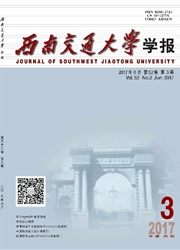

 中文摘要:
中文摘要:
本文旨在建立一种交通荷载作用下古木建筑振动响应的预测方法.首先,针对本文所提预测方法在扬州准提寺藏经楼进行现场测试,根据测试数据对藏经楼的模态参数进行识别,并采用有限元软件ANSYS建立藏经楼的有限元模型;其次,通过对比交通荷载影响下藏经楼振动响应的预测值和实际测量值,对本文提出的振动预测方法的有效性进行试验验证;最后,采用该预测方法对车速相差不大、荷载幅值更大的汽车影响下的藏经楼振动响应进行预测.测试数据及数值计算结果表明:在某典型汽车影响下二楼测点处的峰值加速度的预测值与实际测量值之间相对误差仅为1.47%,说明采用本文所提振动预测方法可以有效地预测交通荷载作用下古木建筑的振动响应.
 英文摘要:
英文摘要:
The aim of this work is to establish a method for predicting vibrations induced in ancientwooden structures by traffic loads. First, a field test was performed at the Buddhist sutra depositary at Yangzhou Zhunti Temple, based on the prediction method. The modal parameters were identified from the experimental data, and the FE model was established using ANSYS. Next, the efficiency of the prediction method was validated by comparing the predicted values of the traffic load-induced vibrations of the Buddhist sutra depositary with the corresponding experimental data. Finally, the vibration response of the Buddhist sutra depositary under the influence of heavy traffic load moving at high speed was predicted. The comparison between experimental data and numerical calculations reveals that the relative error between the predicted value and the experimental data of the peak acceleration induced by a typical vehicle is as small as 1. 47 % . This indicates that the vibration response of a certain structure under the influence of traffic load can be effectively predicted by the proposed method.
 同期刊论文项目
同期刊论文项目
 同项目期刊论文
同项目期刊论文
 期刊信息
期刊信息
